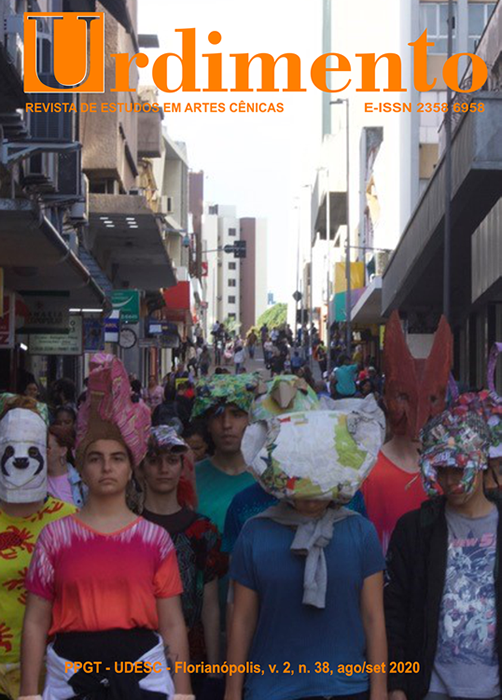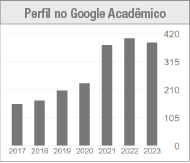O estranhamento do turismo controlado: no áudio tour Remote Buenos Aires do Rimini Protokoll
DOI:
https://doi.org/10.5965/14145731023820200013Palavras-chave:
Cidade, Dispositivo, Experiência, Festival, ParticipaçãoResumo
A hipótese de análise crítica de Remote Buenos Aires do Rimini Protokoll apresentada neste artigo é que o áudio tour, na sua estrutura de deslocamento pela cidade, reproduz o controle do turismo de massas ao invés de produzir uma vivência específica do participante com a cidade e com os outros participantes. A experiência que o áudio tour possibilita aos participantes, na sua dramaturgia, é um estranhamento sobre o comportamento de massa, sobre a relação entre o humano e a máquina, e sobre a teatralidade da vida cotidiana. Falta, entretanto, uma crítica às condicionantes sócio-históricas da produção do espaço da cidade. Ao final da análise, apontamos também para uma contradição do grupo Rimini Protokoll no modo de produção da série Remote X relacionada com a lógica de turismo do circuito de festivais internacionais de teatro.
Downloads
Referências
AGAMBEN, Giorgio. Infância e história: destruição da experiência e origem da história. Trad. de Henrique Burigo. Belo Horizonte: Editora UFMG, 2005.
AGAMBEN, Giorgio. O que é um dispositivo? In: AGAMBEN Giorgio. O que é o contemporâneo? e outros ensaios. Trad. Vinícius Honesko. Chapecó: Argos, 2009.
BENJAMIN, Walter; BOLLE, Willi (org.); TIEDEMANN, Rolf(org.). Passagens. Trad. Irene Aron e Cleonice Paes Barreto Mourão. Belo Horizonte: Editora UFMG; São Paulo: Imprensa Oficial do Estado de São Paulo, 2009.
BENJAMIN, Walter. O narrador. In: BENJAMIN, Walter. Obras escolhidas. Vol. 1. Magia e técnica, arte e política. Trad. Sérgio Paulo Rouanet. São Paulo: Brasiliense, 1987.
DELEUZE, Gilles. Post-scriptum sobre as sociedades de controle. In: DELEUZE, Gilles. Conversações. Trad. Peter Pál Pelbart. São Paulo: Ed. 34, 1992.
DER SPIEGEL. Um ein Flüchtlingsheim anzuzünden, muss man nicht 'Mein Kampf' lesen. Disponível em: https://www.spiegel.de/kultur/gesellschaft/mein-kampf-im-theater-so-reagieren-die-zuschauer-a-1070968.html. Acesso em: 23 jun. 2020.
FÉRAL, Josette. A teatralidade. In: FÉRAL, Josette. Além dos limites: teoria e prática do teatro. Trad. José. Guinsburg …. [et al.]. São Paulo: Perspectiva, 2015.
FREUD, Sigmund. O estranho. In: FREUD, Sigmund. Uma neurose infantil e outros trabalhos. (1917-1918). Trad. Jayme Salomão. Rio de Janeiro: Imago, 1976.
FREUD, Sigmund. O inquietante. In: FREUD, Sigmund. História de uma neurose infantil (“O homem dos lobos”): além do princípio do prazer e outros textos (1917-1920). Trad. Paulo César de Souza. São Paulo: Companhia das Letras, 2010.
FREUD, Sigmund. Psicologia das massas e análise do Eu. In: FREUD, Sigmund. Psicologia das massas e análise do Eu e outros textos. (1920-1923). Trad. Paulo César de Souza. São Paulo: Companhia das Letras, 2011.
FOUCAULT, Michel. Em defesa da sociedade. Trad. Maria Ermantina Galvão. São Paulo: Martins Fontes, 2010.
KAEGI, Stefan. Remote Buenos Aires. 2017. (Não publicado).
LIMA, Fátima Costa de e BAUMGÄRTEL, Stephan. O flashmob e o rolezinho: considerações sobre a construção estética de um corpo coletivo político num espaço de ostentação capitalista. PROAÑO-GÓMEZ, Lola e VERZERO, Lorena (Orgs.). Perspectivas políticas de la escena latino-americana - diálogos en tiempo presente. Buenos Aires / Los Angeles: Argus-a, 2017.
RIMINI PROTOKOLL. Remote X. Disponível em https://www.rimini-protokoll.de/website/de/project/remote-x2020 Acesso em: 23 jun. 2020.
SCHIOCCHET, Michele. Site-specific art? Reflexões a respeito da performance em espaços não tradicionalmente dedicados a esta. Urdimento, Florianópolis, v. 2. n. 17. p. 131-136, 2011.
Downloads
Publicado
Como Citar
Edição
Seção
Licença
Copyright (c) 2020 Urdimento - Revista de Estudos em Artes Cênicas

Este trabalho está licenciado sob uma licença Creative Commons Attribution 4.0 International License.
Declaração de Direito Autoral
Os leitores são livres para transferir, imprimir e utilizar os artigos publicados na Revista, desde que haja sempre menção explícita ao(s) autor (es) e à Urdimentoe que não haja qualquer alteração no trabalho original. Qualquer outro uso dos textos precisa ser aprovado pelo(s) autor (es) e pela Revista. Ao submeter um artigo à Urdimento e tê-lo aprovado os autores concordam em ceder, sem remuneração, os seguintes direitos à Revista: os direitos de primeira publicação e a permissão para que a Revista redistribua esse artigo e seus meta dados aos serviços de indexação e referência que seus editores julguem apropriados.
Este periódico utiliza uma Licença de Atribuição Creative Commons– (CC BY 4.0)




